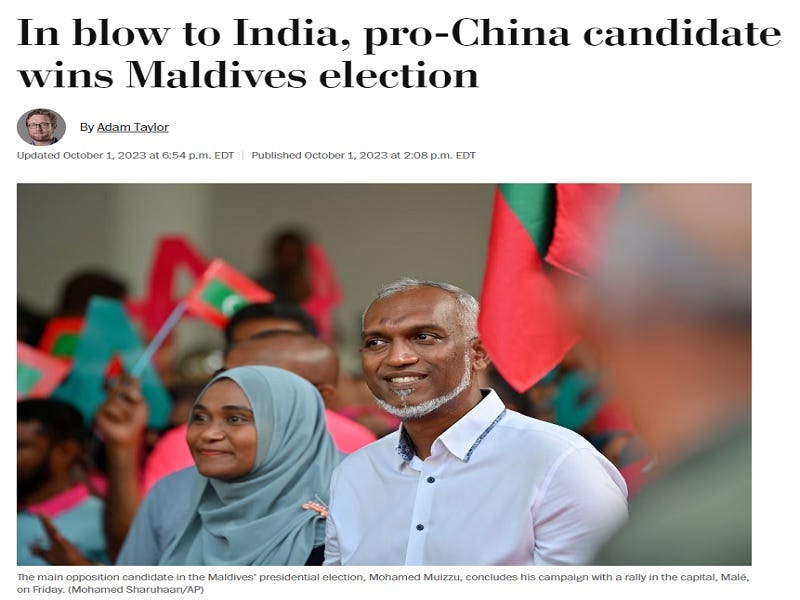For as much as Mohamed Muizzu might want to pivot away from India towards China, and it remains unclear how sincerely he’s committed to this platform seeing as how it opportunistically tapped into the Maldives’ anti-Indian vote bank without any cost at present, this is practically impossible for him to do and then maintain.
Some in India are worried about the future of their country’s relations with the Maldives after the latter’s latest elections. Mohamed Muizzu ousted the incumbent after campaigning on a platform that called for the exit of India’s training contingent from the archipelago and the comprehensive expansion of ties with China. The Washington Post wrote about this in their piece about how “In blow to India, pro-China candidate wins Maldives election”, which was surprisingly balanced despite the clickbait title.
For as much as Muizzu might want to pivot away from India towards China, and it remains unclear how sincerely he’s committed to this platform seeing as how it opportunistically tapped into the Maldives’ anti-Indian vote bank without any cost at present, this is practically impossible for him to do and then maintain. Simple geographic reasons limit the extent to which he can meaningfully make good on this implied promise since India is next door while China is on the other side of the Indo-Pacific.
Even if he went all out in cutting off his country’s traditional and deeply established multidimensional ties with India at the expense of all Maldivian citizens’ objective interests, then it’s unrealistic to imagine that India would let the Maldives devolve into an anti-Indian outpost akin to what Ukraine is for Russia. Unlike that Eastern European country that borders several NATO members, none of India’s rivals has direct access to the Maldives, which further reduces the chances of it sustaining any anti-Indian pivot.
In the worst-case scenario, India could easily intervene to oust any rogue government that poses a credible threat to its national security interests, though it’s unlikely that events would ever get that far barring something absolutely unforeseeable. Considering this, the most that Muizzu will likely do is request the departure of India’s training contingent from the Maldives and possibly invite more Chinese investment, particularly in civilian infrastructure like naval ports and possibly also airports.
The Sri Lankan precedent of India successfully managing relations with a somewhat unfriendly government on that much larger island during the Rajapaksa brothers’ rule suggests that it’ll also be able to manage relations with Muizzu’s Maldives as well. Despite prior concerns that China was plotting to clandestinely establish a naval base in Sri Lanka, which Beijing consistently denied, that scenario didn’t unfold. Likewise, it’s also not expected to unfold in the Maldives either.
Nevertheless, certain interest groups in India and the West have a stake in exaggerating the outcome of this latest election, which explains a lot of the hype about what just happened. For instance, the Indian opposition wants to exploit the optics of this development for electioneering purposes ahead of spring’s polls, which they expect will be supported by the West’s liberal-globalist policymaking faction. Both want to mislead voters into thinking that the BJP “lost the Maldives”, which isn’t true.
This island nation’s tourism industry, which accounts for 28% of its GDP and 60% of its foreign exchange, was hit hard by the COVID-19 pandemic. It was therefore predictable that anti-incumbent sentiment would be stronger than usual during its next presidential elections. Not only that, but such conditions also make it much easier to mislead voters into blaming a scapegoat for their problems, which in this case is India. Accordingly, nostalgia for the former Chinese-aligned government naturally spiked too.
These factors are what’s really responsible for Muizzu’s victory, not anything that India did or didn’t do with respect to the Maldives. It also helped that he hitched his wagon to Yameen Abdul Gayoom, the former Chinese-aligned president who’s presently serving an 11-year prison term on corruption charges that he claims are politically motivated. Yameen is still genuinely popular and took maximum advantage of his country’s anti-Indian vote bank during his half-decade in power, both of which aided his ally.
Considering this, observers should actually have expected Muizzu’s victory, not the incumbent leader’s who he just replaced. At the same time, recalling the simple geographic reasons that were earlier mentioned in this analysis, nobody should seriously expect him to undertake an anti-Indian pivot. It would be both counterproductive and unsustainable, but he’ll still probably pay some lip service to his campaign rhetoric, which will fuel the efforts of those with self-interested motives in exaggerating this.





"...request the departure of India’s training contingent..."
That's not such a bad thing; the underlying current should be away from militarism, so that shouldn't do too many people too much harm.
"...possibly invite more Chinese investment, particularly in civilian infrastructure like naval ports and possibly also airports...."
By the same measure, that can't hurt too much, either.
"Likewise, it’s also not expected to unfold in the Maldives either."
So, that makes for two wins and no losses, by my count. As 'Meatloaf' (I think it was.) said, "Two outta three ain't bad."
"...exploit the optics..."
Never a good sign.
"...supported by the West..."
Even worse!
"...corruption charges that he claims are politically motivated."
Watch this space for news on Slovakia's most recent contribution, as: a) "Fico could strain EU and NATO unity" leads to b) the murder of journalist Ján Kuciak followed by the inevitable claims and charges. Same-same.
"... fuel the efforts of those with self-interested motives..."
As above; or, as Led Zepplin said (and I know this one):
"Always the same, playing your game, drive me insane; trouble's gonna come to you.
One of these days, and it won't be long..."